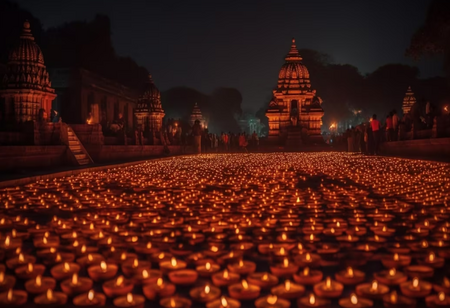Ayodhya: A Religious Extravaganza to Commemorate Modi Inaugurating the Ram Temple
By Consultants Review Team
 In a religious spectacle spearheaded by Prime Minister Narendra Modi months before he runs for an unusual third term in elections, a massive temple dedicated to the Hindu god Lord Ram opened on Monday on a site in India that millions believe to be his birthplace. A divisive political issue that helped propel Modi's Hindu nationalist Bharatiya Janata Party (BJP) to fame and power is the construction of the temple, a 35-year-old party fundamental promise.
In a religious spectacle spearheaded by Prime Minister Narendra Modi months before he runs for an unusual third term in elections, a massive temple dedicated to the Hindu god Lord Ram opened on Monday on a site in India that millions believe to be his birthplace. A divisive political issue that helped propel Modi's Hindu nationalist Bharatiya Janata Party (BJP) to fame and power is the construction of the temple, a 35-year-old party fundamental promise.
Following centuries of oppression by Muslim and colonial powers, Hindu organizations are depicting the inauguration ceremony in the northern city of Ayodhya as the pinnacle of the Hindu awakening. It's also perceived as the official start of the very religious leader Modi's reelection campaign for the general elections that are scheduled for May. After a Hindu mob in 1992 destroyed a mosque dating back to the 16th century, the temple site became a hotbed of violence and was fiercely disputed for decades by both Hindus and Muslims.
The majority-Hindu of population of India believes that the location is the birthplace of Lord Ram, and it was sacred to them even before the Muslim Mughals demolished a temple there and erected the Babri Masjid, or mosque, there in 1528.
The land was given to the Hindus by the Supreme Court in 2019, and Muslims were given a separate area. Ayodhya is scheduled to see thousands of BJP members and its affiliates, religious leaders, and devotees from all over the country assemble today for the temple's inauguration, where Modi will participate in the final ceremonies.
POLITICAL CONTROVERSY AND RELIGIOUS OUTPOURING
At the start of 11 days of extraordinary ceremonies leading up to the inauguration, Modi declared on X, "The Lord has made me an instrument to represent all the people of India during the consecration."
Modi has asked Indians to light lamps in their homes and neighborhood temples on Monday evening and celebrate Diwali, the Hindu festival of lights that typically comes in October or November, calling it a "historic moment" when Lord Ram will take his position in his great temple. "It feels more like the beginning of the general election campaign than a religious ceremony," political analyst Prithvi Datta Chandra Shobhi, who teaches at Krea University in southern India, said of the temple's consecration.
He declared, "The prime minister seems to be acting as an emperor performing a significant ceremonial sacrifice."
Only the first phase of the temple, which occupies 2.67 acres (1.08 hectares) within a complex of 70 acres (28.33 hectares), is complete. December 2025 is when the second and final phase is anticipated to be finished. The project is fully supported by domestic donations, with an estimated cost of 15 billion rupees ($181 million). Prior to the consecration, Hindus throughout India have shown a great deal of emotion; they have flown holy flags in residential colonies and markets, organized special prayers, and made arrangements to watch the live telecast of the event on large screens today.
Major opposition groups, such as the main opposition Congress, have declined invitations to attend the inauguration, claiming it has turned into a political event for Modi. This has also caused a political scandal.
Muslim organizations said they will accept the 2019 court decision, which handed Hindus ownership of the site, "with humility," while not being delighted about it. After almost five years, they said they had moved on. “We applaud the Supreme Court's directive, which is why the temple's construction is proceeding. I don't think there's any feeling of ill-will in the Muslim community," said Zufar Ahmad Faruqi, the leader of the Indo-Islamic Cultural Foundation, which is constructing a new mosque in Ayodhya approximately 25 kilometers (15 miles) from the temple.




